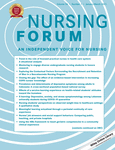Professional intimacy in nursing practice: A concept analysis
Abstract
Aim
This paper provides a critical analysis of the concept of professional intimacy in nursing practice.
Background
Professional intimacy is a key attribute to the therapeutic nurse–patient relationship. However, there is a lack of clarity on the concept from a nursing perspective and little research has been done to explore the multiple dimensions of professional intimacy. Because of this, there is tentativeness in enacting and openly discussing this concept.
Design
The concept analysis approach of Walker and Avant (2011) was used to guide this manuscript.
Review Methods
The eight steps described by Walker and Avant (2011) were implemented to identify antecedents, defining attributes, empirical referents, and consequences of professional intimacy using the literature published both historically and currently.
Results
The review identified 11 articles and based on analysis of the included articles, professional intimacy is the therapeutic relationship between a nurse and a patient that fosters closeness, self-disclosure, reciprocity, and trust at physical, psychological, and/or spiritual levels.
Conclusion
This concept analysis shows that professional intimacy influences nursing satisfaction and promotes optimal patient outcomes. Nurses need to recognize that professional intimacy does not involve a crossing of professional boundaries and is vital to quality care.




